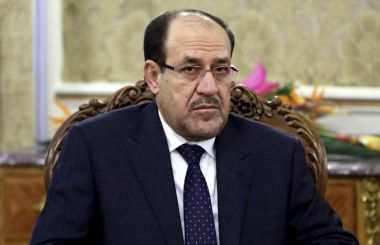Iraqi officials forming new government to combat ISIS

Iraqi officials moved quickly to replace Prime Minister Nouri al-Maliki after electing a new president this week.
President Fouad Massoum overlooked al-Maliki and nominated Deputy Prime Minister Haider al-Ibadi as the country's executive authority on Monday.
Massoum directed al-Ibadi to form a new government within 30 days to "protect the Iraqi people." Secretary of State John Kerry applauded the direction of the new government, and urged al-Maliki to step down peacefully, Fox News reports.
"Our hope is that Mr. Maliki will not stir those waters," Kerry told reporters on Monday.
"One thing all Iraqis need to know, that there will be little international support of any kind whatsoever for anything that deviates from the legitimate constitutional process that is in place and being worked on now.
"They need to finish that and give a new government an opportunity to be voted on and moved forward."
In a speech made at midnight, al-Maliki insisted he be nominated for a third term.
"This attitude represents a coup on the constitution and the political process in a country that is governed by a democratic and federal system," al-Maliki said.
"The deliberate violation of the constitution by the president will have grave consequences on the unity, the sovereignty, and the independence of Iraq and the entry of the political process into a dark tunnel."
The majority of parliament seats in the April election were won by al-Maliki's State of Law coalition.
Two main streets in Baghdad were closed by al-Maliki's security forces on Monday as hundreds of supporters sang, danced, and chanted, "We are with you, al-Maliki!" There are fears that the former prime minister will use force to remain in office.
Secretary Kerry called for peace.
"What we urge the people of Iraq to do is to be calm," he said. "There should be no use of force, no introduction of troops or militias into this moment of democracy for Iraq."
The infighting weakens the government's effectiveness in responding to the Islamic State of Iraq and al-Sham, or ISIS.
The extremists seek to establish a Sunni Muslim reign across Iraq and Syria. Led by Abu Bakr al Baghdadi, ISIS has increased in power substantially since the withdrawal of U.S. troops from Iraq in December 2011. ISIS militants control the Iraqi cities of Mosul, Baiji, and Fallujah, as well as parts of Syria. They have also posted photos and videos online showing Iraqi policeman and civilians being slaughtered.
The United Nations reported last month that over 5,500 Iraqi civilians were killed by ISIS in the first six months of the year.











